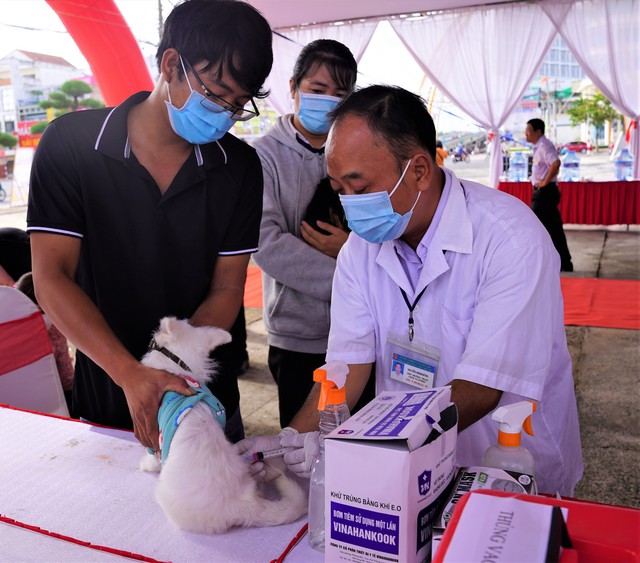Viet Nam targets zero human deaths from rabies by 2030
VGP - Viet Nam is committed to achieving the 2030 goal of eliminating human deaths from dog-mediated rabies by renewing the National Program on the Control and Elimination of Rabies 2022–2030.

A man (L) gets his dog be vaccinated against rabies - Illustration photo
The commitment was made at a meeting jointly hosted by the Ministry of Health, the Ministry of Agriculture and Rural Development, and Ben Tre provincial People’s Committee, with support from FAO, WHO, U.S. CDC in Ben Tre province on September 28.
The event highlighted the shared commitment to the “Zero by 30” goal, reviewed results of Viet Nam’s National Rabies Control Program, and discussed opportunities for supporting increased vaccination in dogs.
Striving for decrease in deaths going forward
While some progress has been made over the past ten years, Viet Nam has continued to report 70 to 100 human deaths from rabies each year.
In the first eight months of 2022, Viet Nam reported 40 human deaths.
Despite a significant decrease in rabies deaths in some provinces, the number of deaths increased in 20 provinces in 2017-2021 compared to the 2011-2016 period.
This highlights the need to adopt lessons learned and work closely with local governments to ensure a decrease in deaths going forward.
The WHO, FAO, and U.S. CDC reaffirmed their continued support to the Government of Viet Nam in developing essential policies and mechanisms to reduce deaths, encouraging the Government particularly at the local level, to prioritize and increase resources for the management of dog populations, the vaccination of dogs, and provision of post exposure prophylaxis for those bitten by dogs.
FAO, WHO and U.S. CDC also vowed to provide ongoing technical support to the Government of Viet Nam as we work together to end human deaths from dog-mediated rabies in Viet Nam in order to achieve “Zero by 2030”.
Acting WHO Representative in Viet Nam Dr Socorro Escalante emphasized the need for strong commitment and the targeting of priority areas in order to eliminate deaths by 2030.
“Strengthening political commitment to ensure access, availability and affordability to proven interventions such as safe, effective and quality-assured vaccines, is critical to saving lives along with ensuring a One Health approach to eliminating rabies,” she added.
Dr Escalante also reiterated, “strong coordination between animal, human health, and other sectors is vital to ensure prevention and control programs are efficiently and effectively managed”.
According to the Acting WHO Representative in Viet Nam, there is increasing international and high-level political support for One Health as a sustainable solution to combat threats such as rabies. Dog vaccination is the most cost-effective single intervention to protect humans from contracting rabies.
By working together using the One Health approach, to increase rabies vaccination coverage in animals to reach at least 70 percent, we can break transmission of rabies to human and accelerate the progress toward Zero by 30 goal, added Dr Rémi Nono Womdim, FAO Representative in Viet Nam.
“To improve the canine vaccination coverage, we need to ensure the availability, accessibility, and affordability (3A) of rabies vaccine,” emphasized Dr. Lindsay Kim, Global Health Security Program director, U.S. CDC office in Viet Nam.
This year’s theme is “One Health, Zero Deaths”, leveraging the concept of One Health that is becoming increasingly entrenched in disease control programs./.

